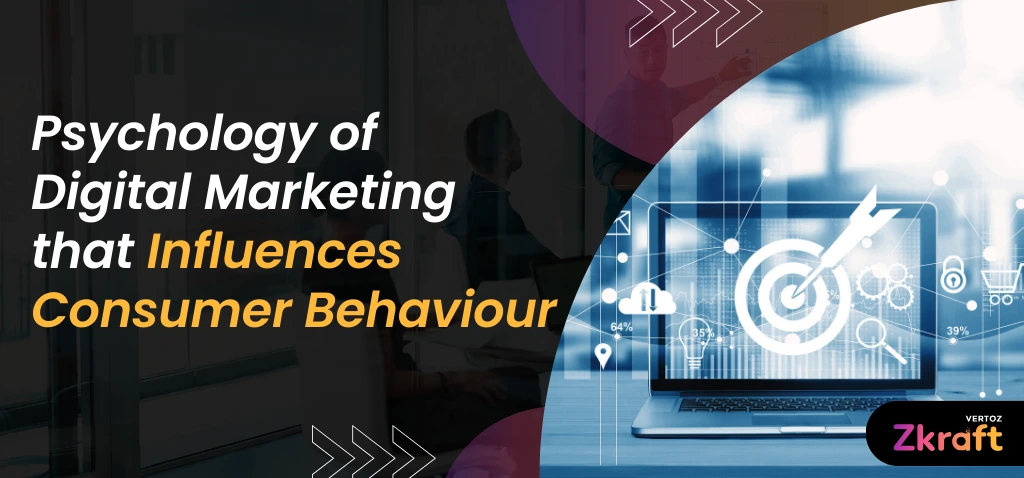Imagine you’re browsing an online store, looking for a new pair of running shoes. You come across two options: one with thousands of five-star reviews and another with no reviews at all. Which one would you choose? Most likely, you’d go for the one with positive reviews—because social proof influences our decisions more than we realize. This is just one example of how psychology plays a critical role in digital marketing.
Nowadays, businesses are constantly competing for consumer attention. With an overwhelming number of choices available, understanding the psychology behind consumer behavior can help brands craft marketing strategies that capture attention but also drive action. Let’s explore how psychology shapes digital marketing and why it’s essential for success.
What is Psychological Marketing?
At its core, digital marketing is about understanding human behavior, what drives people to make decisions, and how they interact with content. Psychological marketing takes this a step further by leveraging principles of human emotions, decision-making processes, and cognitive biases to create compelling marketing campaigns. When brands apply psychological insights, they can craft messages that resonate more deeply with their audience, making their marketing efforts more effective.
How Psychology Influences Digital Marketing
Understanding the psychological triggers that affect consumer behavior allows marketers to design strategies that appeal to their audience on a deeper level. Here’s how psychology impacts digital marketing:
- Emotional Connection Drives Decisions
Consumers don’t just buy products they buy emotions, experiences, and solutions to their problems. Emotional marketing taps into feelings like joy, fear, trust, or nostalgia to create a connection with the audience. Think about brands like Nike, which uses inspirational storytelling to motivate consumers rather than just selling shoes.
- Cognitive Biases and Decision-Making
Our brains rely on cognitive shortcuts to make quick decisions. Marketers can use these biases to influence consumer choices. For example:
- Social Proof: People tend to follow the crowd. If others are buying a product and leaving positive reviews, new customers are more likely to trust and purchase it.
- Scarcity Effect: Limited-time offers or low-stock alerts create a sense of urgency, encouraging immediate action.
- Anchoring Bias: Consumers tend to rely on the first set of information they see. Showing a higher original price before a discounted price makes the deal seem more attractive.
- The Role of Motivation in Consumer Behavior
Psychology helps marketers understand what drives people to take action. Consumers are motivated by different factors, such as:
- Desire for exclusivity: VIP memberships or limited-edition products make people feel special.
- Convenience and ease: Streamlined checkout processes or one-click purchases enhance user experience.
- Fear of missing out: Highlighting what others are buying or limited stock availability can push hesitant buyers to act quickly.
The Power of Social Proof in Online Marketing
One of the most powerful psychological triggers in digital marketing is social proof. Studies show that 91% of consumers aged 18-34 trust online reviews as much as personal recommendations. Marketers use social proof through:
- Customer reviews and testimonials
- Influencer endorsements
- User-generated content (UGC) on social media
- Trust badges and certifications on websites By integrating social proof into marketing strategies, brands can build credibility and encourage potential customers to make a purchase.
Ethical Considerations in Psychological Marketing
While psychology can be a powerful tool in digital marketing, it’s crucial to use it ethically. Manipulating consumers through deceptive tactics can backfire and harm a brand’s reputation. Here’s how marketers can maintain ethical standards:
- Transparency and honesty: Avoid misleading claims or false urgency tactics.
- Respecting consumer privacy: Collect data responsibly and ensure users are aware of how their information is used.
- Building trust: Long-term customer relationships are more valuable than short-term gains from manipulative strategies.
Psychology plays a significant role in shaping consumer behavior, and understanding these principles can give businesses a competitive edge in digital marketing. However, ethical marketing practices should always be prioritized to build long-term trust and brand loyalty.
At ZKraft, we specialize in crafting digital marketing strategies that resonate with your audience. Whether it’s emotional branding, persuasion techniques, or social proof integration, we help brands navigate the psychology of marketing to drive real results.

